CNA345 Professional Practice 4: Joseph Case Study & Discharge Plan
VerifiedAdded on 2023/06/03
|15
|3219
|303
Case Study
AI Summary
This case study presents a comprehensive discharge plan for Joseph, focusing on a strengths-based approach and shared transfer of care. It addresses Joseph's transfer of care, applying nursing principles, ethical and legal considerations, and the importance of culturally competent care. The plan includes home care packages, financial support, social activities, and support for Joseph and his family members, aiming to ensure a smooth transition and positive health outcomes. The study emphasizes the need for interdisciplinary collaboration and patient-centered care, considering Joseph's cultural background and personal preferences to facilitate a comfortable recovery at home. This detailed plan is designed to improve Joseph's well-being and support his family in providing the necessary care.
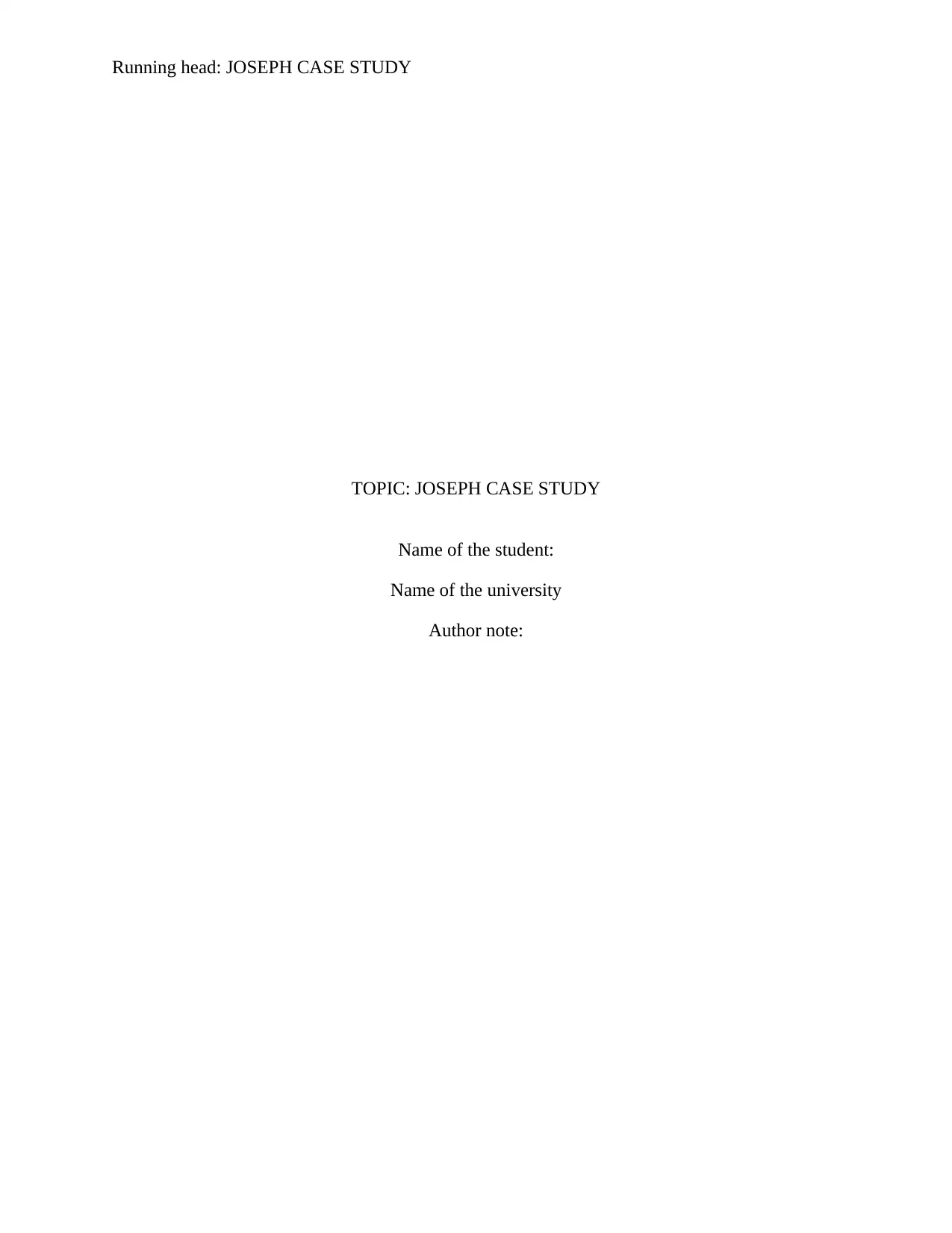
Running head: JOSEPH CASE STUDY
TOPIC: JOSEPH CASE STUDY
Name of the student:
Name of the university
Author note:
TOPIC: JOSEPH CASE STUDY
Name of the student:
Name of the university
Author note:
Paraphrase This Document
Need a fresh take? Get an instant paraphrase of this document with our AI Paraphraser
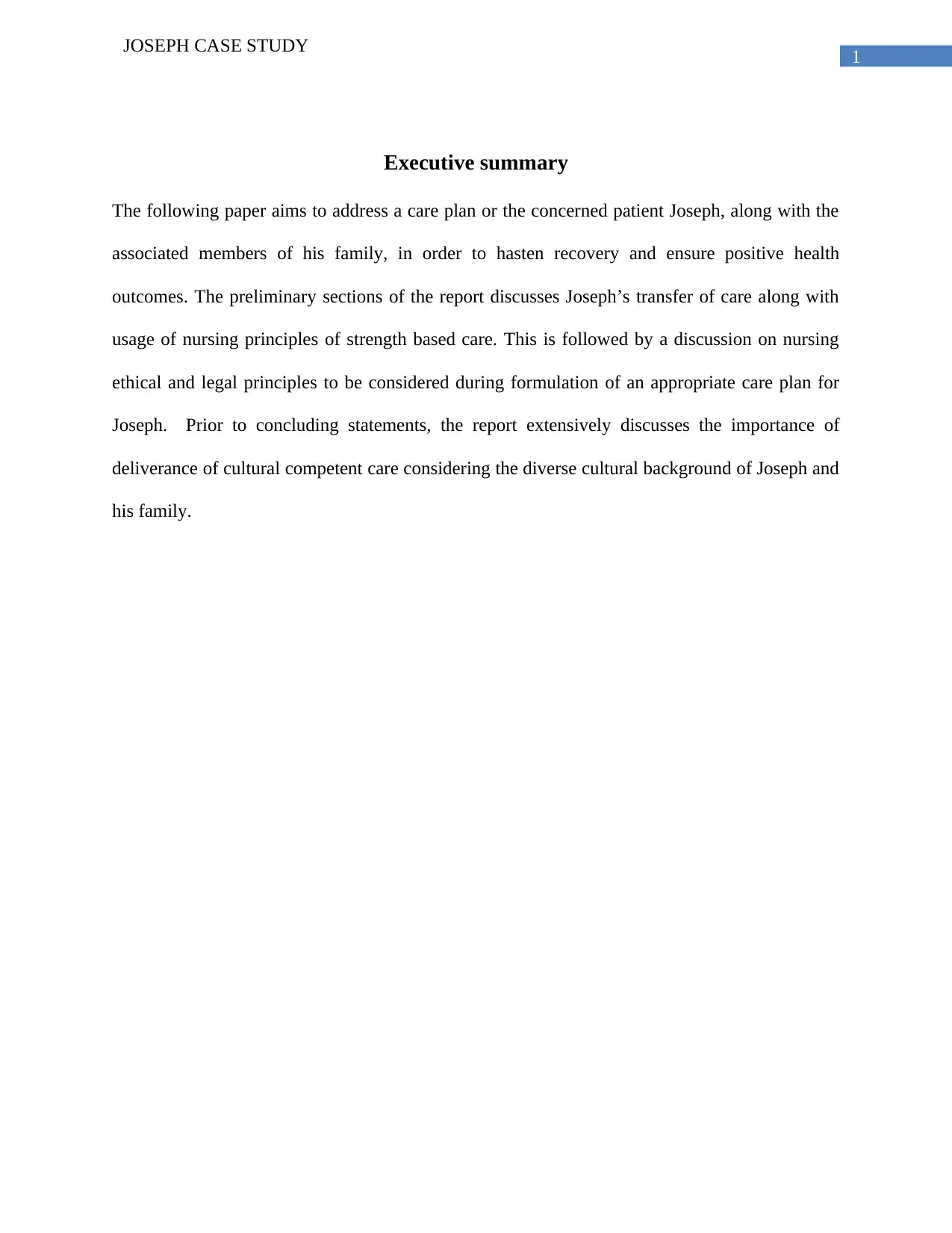
1
JOSEPH CASE STUDY
Executive summary
The following paper aims to address a care plan or the concerned patient Joseph, along with the
associated members of his family, in order to hasten recovery and ensure positive health
outcomes. The preliminary sections of the report discusses Joseph’s transfer of care along with
usage of nursing principles of strength based care. This is followed by a discussion on nursing
ethical and legal principles to be considered during formulation of an appropriate care plan for
Joseph. Prior to concluding statements, the report extensively discusses the importance of
deliverance of cultural competent care considering the diverse cultural background of Joseph and
his family.
JOSEPH CASE STUDY
Executive summary
The following paper aims to address a care plan or the concerned patient Joseph, along with the
associated members of his family, in order to hasten recovery and ensure positive health
outcomes. The preliminary sections of the report discusses Joseph’s transfer of care along with
usage of nursing principles of strength based care. This is followed by a discussion on nursing
ethical and legal principles to be considered during formulation of an appropriate care plan for
Joseph. Prior to concluding statements, the report extensively discusses the importance of
deliverance of cultural competent care considering the diverse cultural background of Joseph and
his family.
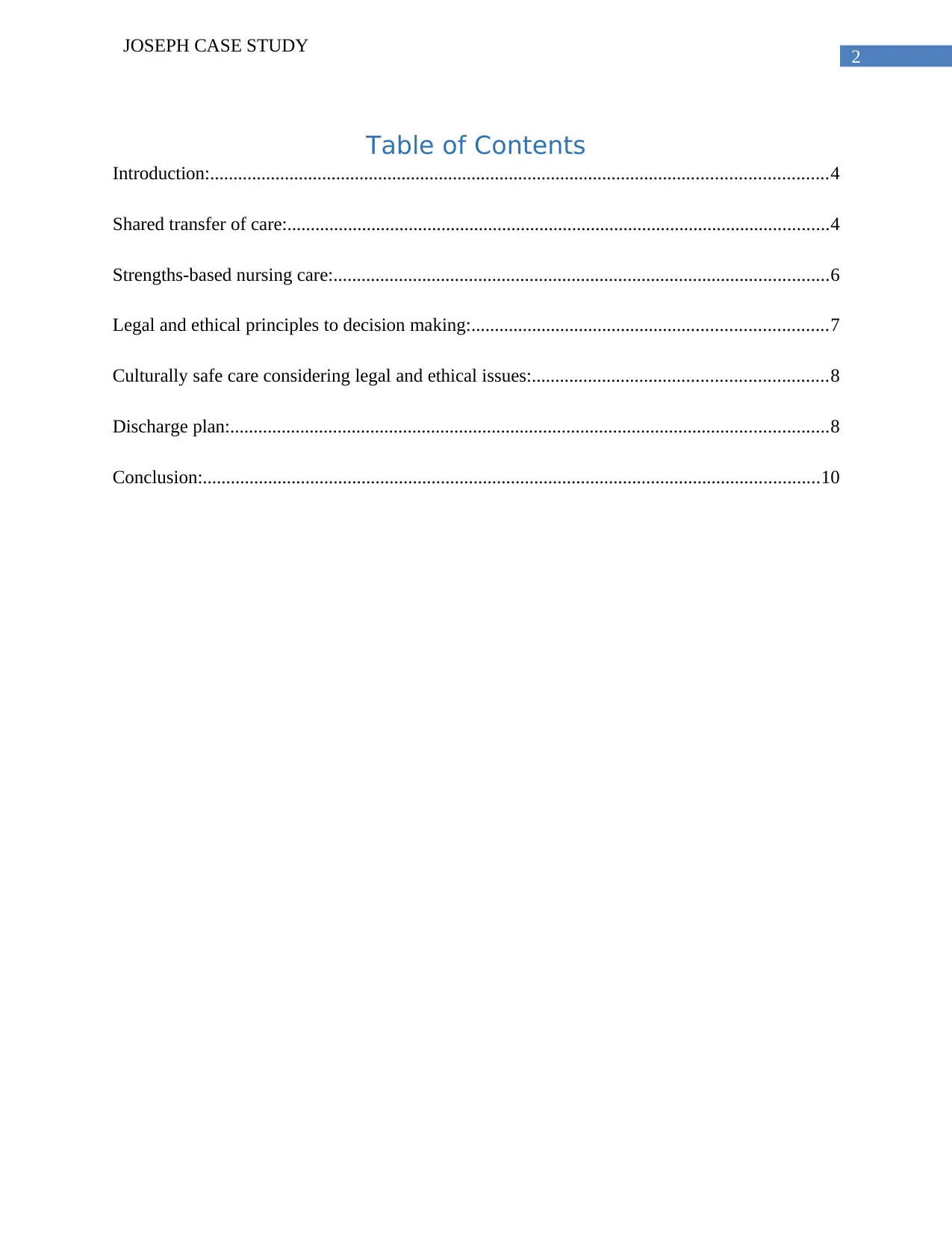
2
JOSEPH CASE STUDY
Table of Contents
Introduction:....................................................................................................................................4
Shared transfer of care:....................................................................................................................4
Strengths-based nursing care:..........................................................................................................6
Legal and ethical principles to decision making:............................................................................7
Culturally safe care considering legal and ethical issues:...............................................................8
Discharge plan:................................................................................................................................8
Conclusion:....................................................................................................................................10
JOSEPH CASE STUDY
Table of Contents
Introduction:....................................................................................................................................4
Shared transfer of care:....................................................................................................................4
Strengths-based nursing care:..........................................................................................................6
Legal and ethical principles to decision making:............................................................................7
Culturally safe care considering legal and ethical issues:...............................................................8
Discharge plan:................................................................................................................................8
Conclusion:....................................................................................................................................10
⊘ This is a preview!⊘
Do you want full access?
Subscribe today to unlock all pages.

Trusted by 1+ million students worldwide
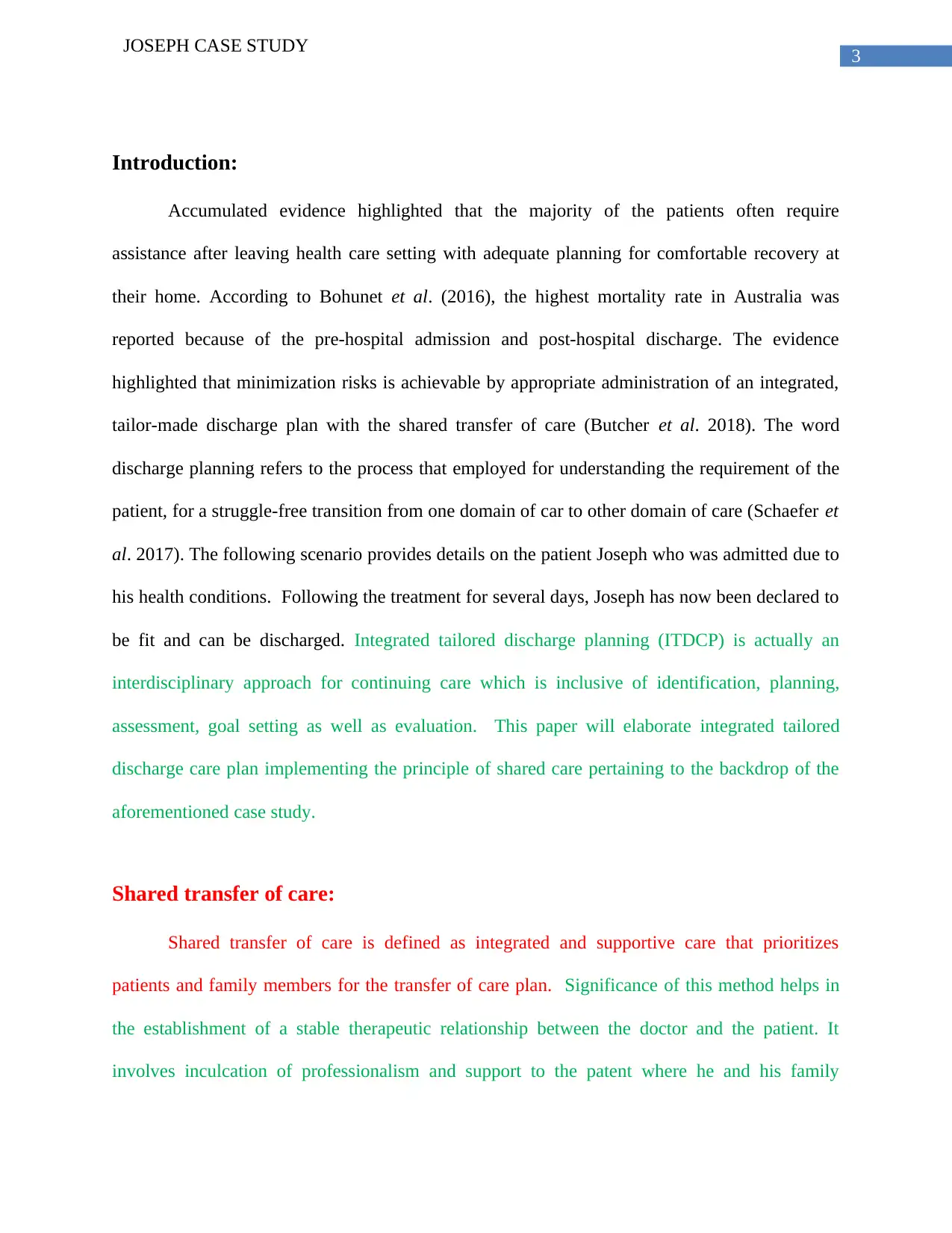
3
JOSEPH CASE STUDY
Introduction:
Accumulated evidence highlighted that the majority of the patients often require
assistance after leaving health care setting with adequate planning for comfortable recovery at
their home. According to Bohunet et al. (2016), the highest mortality rate in Australia was
reported because of the pre-hospital admission and post-hospital discharge. The evidence
highlighted that minimization risks is achievable by appropriate administration of an integrated,
tailor-made discharge plan with the shared transfer of care (Butcher et al. 2018). The word
discharge planning refers to the process that employed for understanding the requirement of the
patient, for a struggle-free transition from one domain of car to other domain of care (Schaefer et
al. 2017). The following scenario provides details on the patient Joseph who was admitted due to
his health conditions. Following the treatment for several days, Joseph has now been declared to
be fit and can be discharged. Integrated tailored discharge planning (ITDCP) is actually an
interdisciplinary approach for continuing care which is inclusive of identification, planning,
assessment, goal setting as well as evaluation. This paper will elaborate integrated tailored
discharge care plan implementing the principle of shared care pertaining to the backdrop of the
aforementioned case study.
Shared transfer of care:
Shared transfer of care is defined as integrated and supportive care that prioritizes
patients and family members for the transfer of care plan. Significance of this method helps in
the establishment of a stable therapeutic relationship between the doctor and the patient. It
involves inculcation of professionalism and support to the patent where he and his family
JOSEPH CASE STUDY
Introduction:
Accumulated evidence highlighted that the majority of the patients often require
assistance after leaving health care setting with adequate planning for comfortable recovery at
their home. According to Bohunet et al. (2016), the highest mortality rate in Australia was
reported because of the pre-hospital admission and post-hospital discharge. The evidence
highlighted that minimization risks is achievable by appropriate administration of an integrated,
tailor-made discharge plan with the shared transfer of care (Butcher et al. 2018). The word
discharge planning refers to the process that employed for understanding the requirement of the
patient, for a struggle-free transition from one domain of car to other domain of care (Schaefer et
al. 2017). The following scenario provides details on the patient Joseph who was admitted due to
his health conditions. Following the treatment for several days, Joseph has now been declared to
be fit and can be discharged. Integrated tailored discharge planning (ITDCP) is actually an
interdisciplinary approach for continuing care which is inclusive of identification, planning,
assessment, goal setting as well as evaluation. This paper will elaborate integrated tailored
discharge care plan implementing the principle of shared care pertaining to the backdrop of the
aforementioned case study.
Shared transfer of care:
Shared transfer of care is defined as integrated and supportive care that prioritizes
patients and family members for the transfer of care plan. Significance of this method helps in
the establishment of a stable therapeutic relationship between the doctor and the patient. It
involves inculcation of professionalism and support to the patent where he and his family
Paraphrase This Document
Need a fresh take? Get an instant paraphrase of this document with our AI Paraphraser
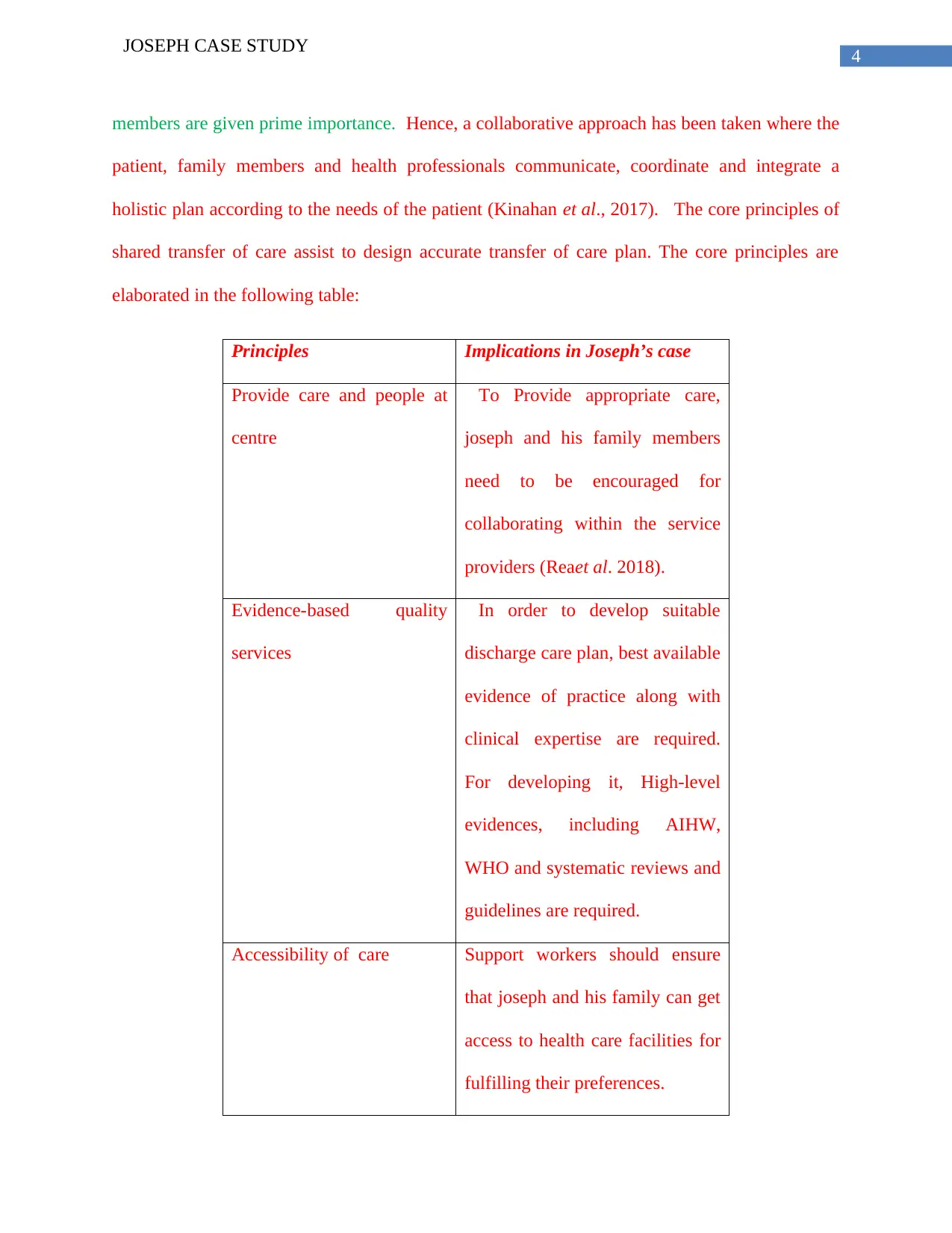
4
JOSEPH CASE STUDY
members are given prime importance. Hence, a collaborative approach has been taken where the
patient, family members and health professionals communicate, coordinate and integrate a
holistic plan according to the needs of the patient (Kinahan et al., 2017). The core principles of
shared transfer of care assist to design accurate transfer of care plan. The core principles are
elaborated in the following table:
Principles Implications in Joseph’s case
Provide care and people at
centre
To Provide appropriate care,
joseph and his family members
need to be encouraged for
collaborating within the service
providers (Reaet al. 2018).
Evidence-based quality
services
In order to develop suitable
discharge care plan, best available
evidence of practice along with
clinical expertise are required.
For developing it, High-level
evidences, including AIHW,
WHO and systematic reviews and
guidelines are required.
Accessibility of care Support workers should ensure
that joseph and his family can get
access to health care facilities for
fulfilling their preferences.
JOSEPH CASE STUDY
members are given prime importance. Hence, a collaborative approach has been taken where the
patient, family members and health professionals communicate, coordinate and integrate a
holistic plan according to the needs of the patient (Kinahan et al., 2017). The core principles of
shared transfer of care assist to design accurate transfer of care plan. The core principles are
elaborated in the following table:
Principles Implications in Joseph’s case
Provide care and people at
centre
To Provide appropriate care,
joseph and his family members
need to be encouraged for
collaborating within the service
providers (Reaet al. 2018).
Evidence-based quality
services
In order to develop suitable
discharge care plan, best available
evidence of practice along with
clinical expertise are required.
For developing it, High-level
evidences, including AIHW,
WHO and systematic reviews and
guidelines are required.
Accessibility of care Support workers should ensure
that joseph and his family can get
access to health care facilities for
fulfilling their preferences.
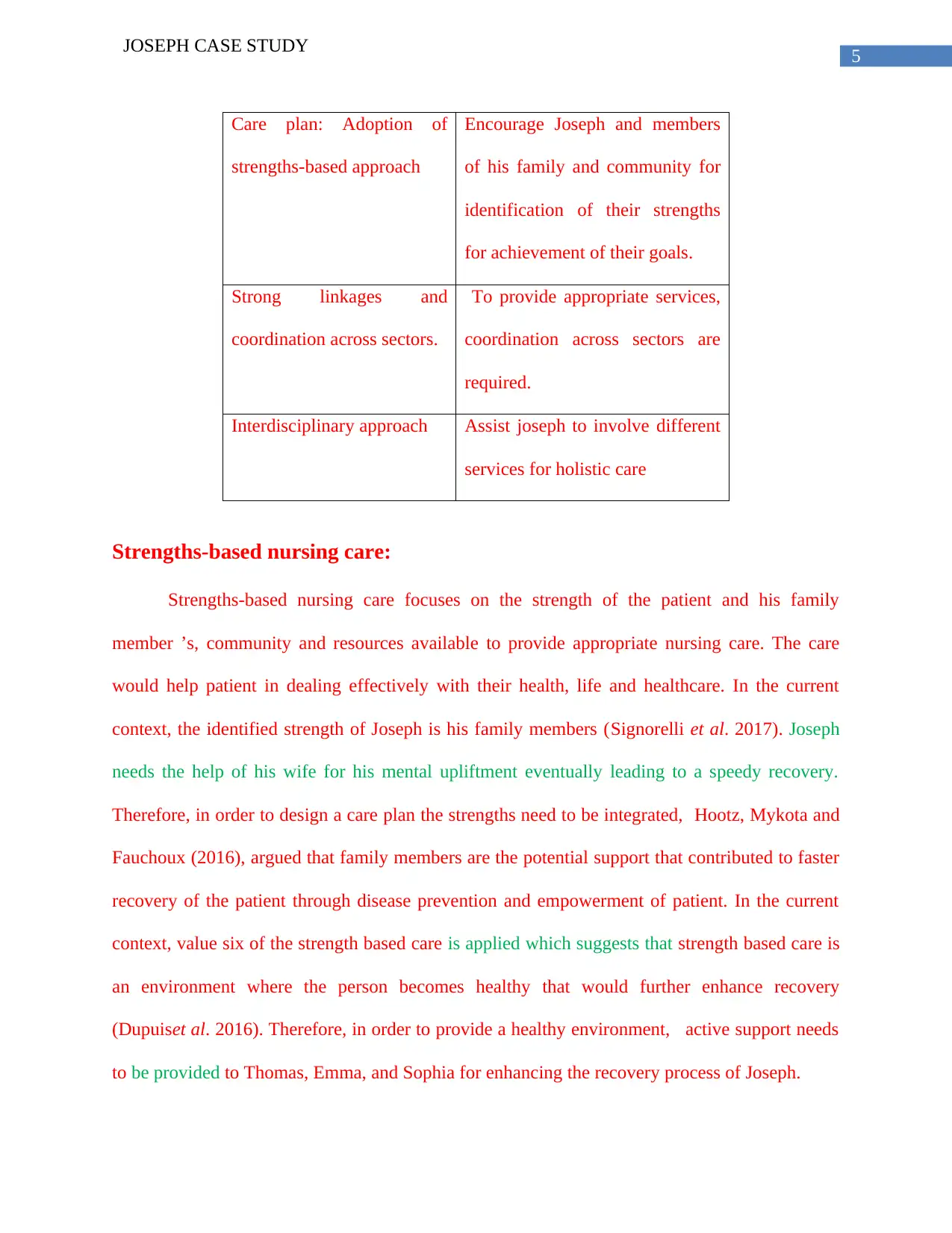
5
JOSEPH CASE STUDY
Care plan: Adoption of
strengths-based approach
Encourage Joseph and members
of his family and community for
identification of their strengths
for achievement of their goals.
Strong linkages and
coordination across sectors.
To provide appropriate services,
coordination across sectors are
required.
Interdisciplinary approach Assist joseph to involve different
services for holistic care
Strengths-based nursing care:
Strengths-based nursing care focuses on the strength of the patient and his family
member ’s, community and resources available to provide appropriate nursing care. The care
would help patient in dealing effectively with their health, life and healthcare. In the current
context, the identified strength of Joseph is his family members (Signorelli et al. 2017). Joseph
needs the help of his wife for his mental upliftment eventually leading to a speedy recovery.
Therefore, in order to design a care plan the strengths need to be integrated, Hootz, Mykota and
Fauchoux (2016), argued that family members are the potential support that contributed to faster
recovery of the patient through disease prevention and empowerment of patient. In the current
context, value six of the strength based care is applied which suggests that strength based care is
an environment where the person becomes healthy that would further enhance recovery
(Dupuiset al. 2016). Therefore, in order to provide a healthy environment, active support needs
to be provided to Thomas, Emma, and Sophia for enhancing the recovery process of Joseph.
JOSEPH CASE STUDY
Care plan: Adoption of
strengths-based approach
Encourage Joseph and members
of his family and community for
identification of their strengths
for achievement of their goals.
Strong linkages and
coordination across sectors.
To provide appropriate services,
coordination across sectors are
required.
Interdisciplinary approach Assist joseph to involve different
services for holistic care
Strengths-based nursing care:
Strengths-based nursing care focuses on the strength of the patient and his family
member ’s, community and resources available to provide appropriate nursing care. The care
would help patient in dealing effectively with their health, life and healthcare. In the current
context, the identified strength of Joseph is his family members (Signorelli et al. 2017). Joseph
needs the help of his wife for his mental upliftment eventually leading to a speedy recovery.
Therefore, in order to design a care plan the strengths need to be integrated, Hootz, Mykota and
Fauchoux (2016), argued that family members are the potential support that contributed to faster
recovery of the patient through disease prevention and empowerment of patient. In the current
context, value six of the strength based care is applied which suggests that strength based care is
an environment where the person becomes healthy that would further enhance recovery
(Dupuiset al. 2016). Therefore, in order to provide a healthy environment, active support needs
to be provided to Thomas, Emma, and Sophia for enhancing the recovery process of Joseph.
⊘ This is a preview!⊘
Do you want full access?
Subscribe today to unlock all pages.

Trusted by 1+ million students worldwide
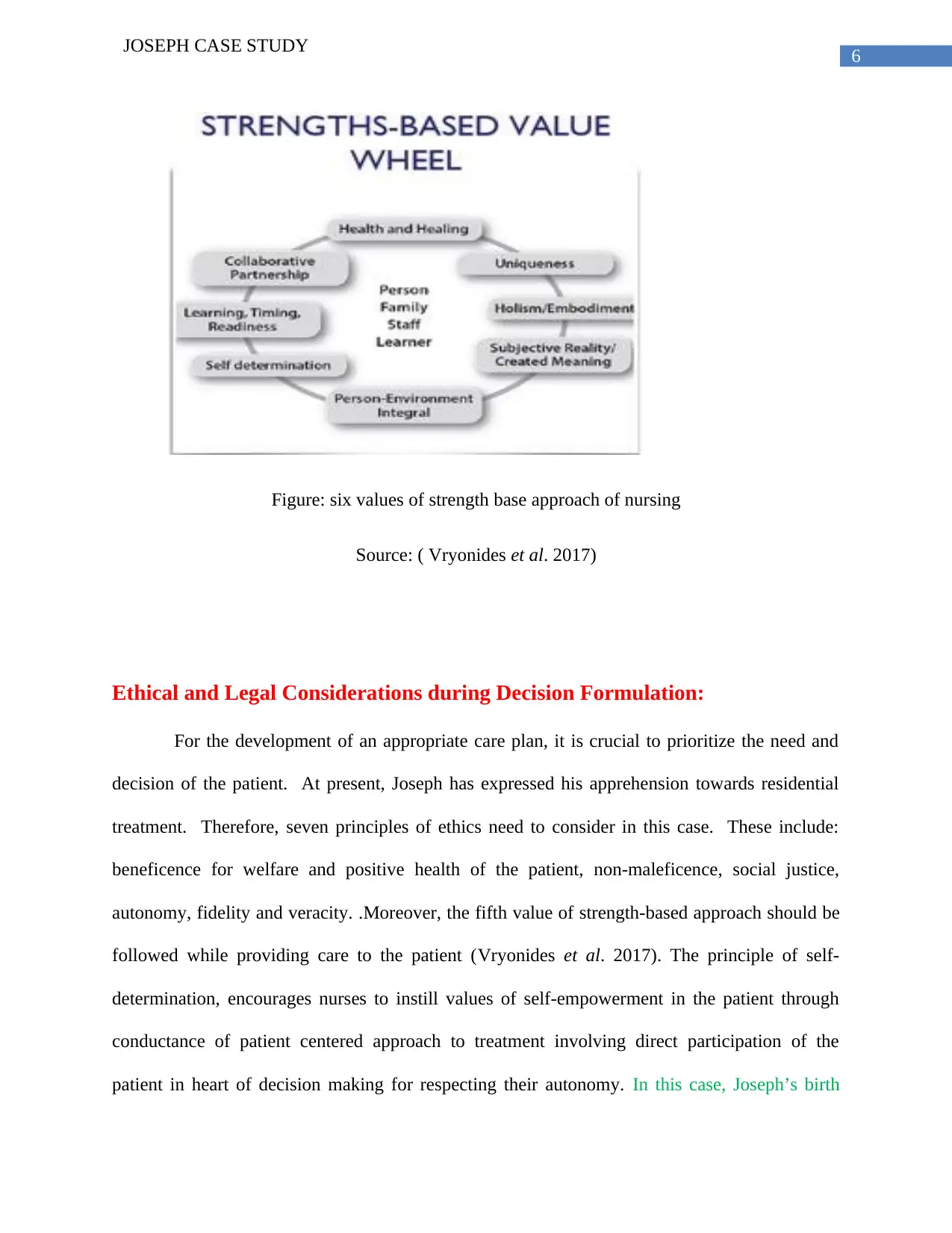
6
JOSEPH CASE STUDY
Figure: six values of strength base approach of nursing
Source: ( Vryonides et al. 2017)
Ethical and Legal Considerations during Decision Formulation:
For the development of an appropriate care plan, it is crucial to prioritize the need and
decision of the patient. At present, Joseph has expressed his apprehension towards residential
treatment. Therefore, seven principles of ethics need to consider in this case. These include:
beneficence for welfare and positive health of the patient, non-maleficence, social justice,
autonomy, fidelity and veracity. .Moreover, the fifth value of strength-based approach should be
followed while providing care to the patient (Vryonides et al. 2017). The principle of self-
determination, encourages nurses to instill values of self-empowerment in the patient through
conductance of patient centered approach to treatment involving direct participation of the
patient in heart of decision making for respecting their autonomy. In this case, Joseph’s birth
JOSEPH CASE STUDY
Figure: six values of strength base approach of nursing
Source: ( Vryonides et al. 2017)
Ethical and Legal Considerations during Decision Formulation:
For the development of an appropriate care plan, it is crucial to prioritize the need and
decision of the patient. At present, Joseph has expressed his apprehension towards residential
treatment. Therefore, seven principles of ethics need to consider in this case. These include:
beneficence for welfare and positive health of the patient, non-maleficence, social justice,
autonomy, fidelity and veracity. .Moreover, the fifth value of strength-based approach should be
followed while providing care to the patient (Vryonides et al. 2017). The principle of self-
determination, encourages nurses to instill values of self-empowerment in the patient through
conductance of patient centered approach to treatment involving direct participation of the
patient in heart of decision making for respecting their autonomy. In this case, Joseph’s birth
Paraphrase This Document
Need a fresh take? Get an instant paraphrase of this document with our AI Paraphraser
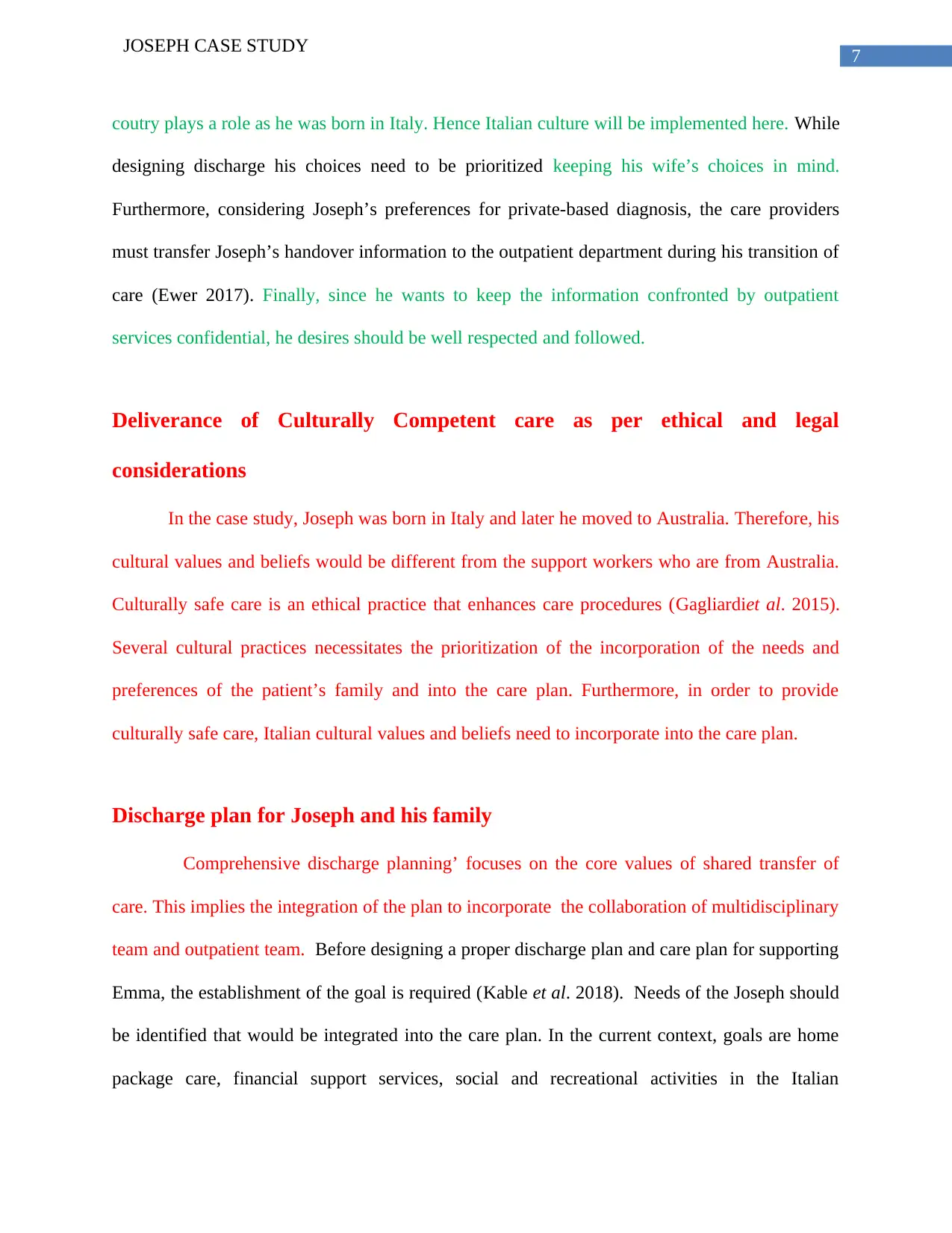
7
JOSEPH CASE STUDY
coutry plays a role as he was born in Italy. Hence Italian culture will be implemented here. While
designing discharge his choices need to be prioritized keeping his wife’s choices in mind.
Furthermore, considering Joseph’s preferences for private-based diagnosis, the care providers
must transfer Joseph’s handover information to the outpatient department during his transition of
care (Ewer 2017). Finally, since he wants to keep the information confronted by outpatient
services confidential, he desires should be well respected and followed.
Deliverance of Culturally Competent care as per ethical and legal
considerations
In the case study, Joseph was born in Italy and later he moved to Australia. Therefore, his
cultural values and beliefs would be different from the support workers who are from Australia.
Culturally safe care is an ethical practice that enhances care procedures (Gagliardiet al. 2015).
Several cultural practices necessitates the prioritization of the incorporation of the needs and
preferences of the patient’s family and into the care plan. Furthermore, in order to provide
culturally safe care, Italian cultural values and beliefs need to incorporate into the care plan.
Discharge plan for Joseph and his family
Comprehensive discharge planning’ focuses on the core values of shared transfer of
care. This implies the integration of the plan to incorporate the collaboration of multidisciplinary
team and outpatient team. Before designing a proper discharge plan and care plan for supporting
Emma, the establishment of the goal is required (Kable et al. 2018). Needs of the Joseph should
be identified that would be integrated into the care plan. In the current context, goals are home
package care, financial support services, social and recreational activities in the Italian
JOSEPH CASE STUDY
coutry plays a role as he was born in Italy. Hence Italian culture will be implemented here. While
designing discharge his choices need to be prioritized keeping his wife’s choices in mind.
Furthermore, considering Joseph’s preferences for private-based diagnosis, the care providers
must transfer Joseph’s handover information to the outpatient department during his transition of
care (Ewer 2017). Finally, since he wants to keep the information confronted by outpatient
services confidential, he desires should be well respected and followed.
Deliverance of Culturally Competent care as per ethical and legal
considerations
In the case study, Joseph was born in Italy and later he moved to Australia. Therefore, his
cultural values and beliefs would be different from the support workers who are from Australia.
Culturally safe care is an ethical practice that enhances care procedures (Gagliardiet al. 2015).
Several cultural practices necessitates the prioritization of the incorporation of the needs and
preferences of the patient’s family and into the care plan. Furthermore, in order to provide
culturally safe care, Italian cultural values and beliefs need to incorporate into the care plan.
Discharge plan for Joseph and his family
Comprehensive discharge planning’ focuses on the core values of shared transfer of
care. This implies the integration of the plan to incorporate the collaboration of multidisciplinary
team and outpatient team. Before designing a proper discharge plan and care plan for supporting
Emma, the establishment of the goal is required (Kable et al. 2018). Needs of the Joseph should
be identified that would be integrated into the care plan. In the current context, goals are home
package care, financial support services, social and recreational activities in the Italian
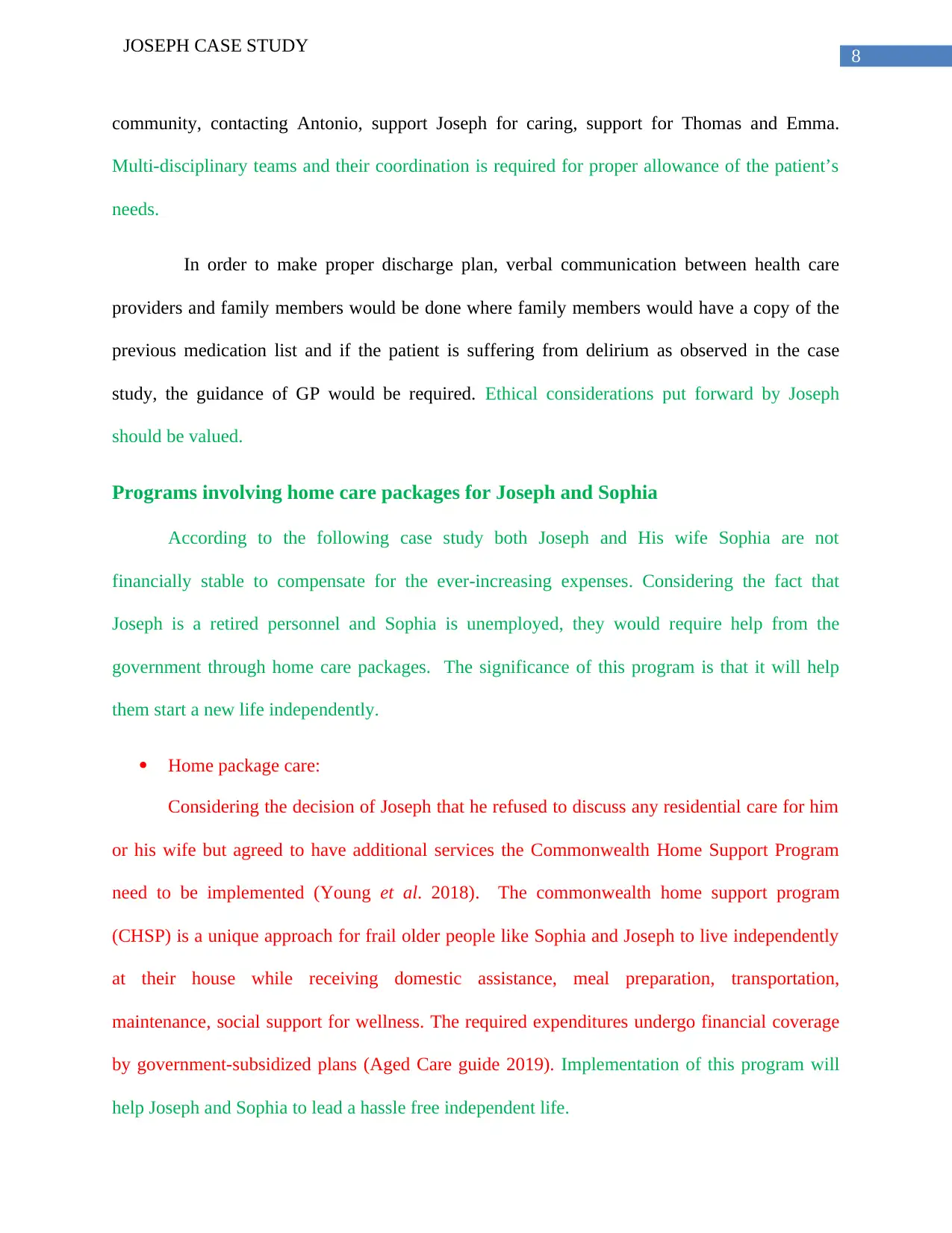
8
JOSEPH CASE STUDY
community, contacting Antonio, support Joseph for caring, support for Thomas and Emma.
Multi-disciplinary teams and their coordination is required for proper allowance of the patient’s
needs.
In order to make proper discharge plan, verbal communication between health care
providers and family members would be done where family members would have a copy of the
previous medication list and if the patient is suffering from delirium as observed in the case
study, the guidance of GP would be required. Ethical considerations put forward by Joseph
should be valued.
Programs involving home care packages for Joseph and Sophia
According to the following case study both Joseph and His wife Sophia are not
financially stable to compensate for the ever-increasing expenses. Considering the fact that
Joseph is a retired personnel and Sophia is unemployed, they would require help from the
government through home care packages. The significance of this program is that it will help
them start a new life independently.
Home package care:
Considering the decision of Joseph that he refused to discuss any residential care for him
or his wife but agreed to have additional services the Commonwealth Home Support Program
need to be implemented (Young et al. 2018). The commonwealth home support program
(CHSP) is a unique approach for frail older people like Sophia and Joseph to live independently
at their house while receiving domestic assistance, meal preparation, transportation,
maintenance, social support for wellness. The required expenditures undergo financial coverage
by government-subsidized plans (Aged Care guide 2019). Implementation of this program will
help Joseph and Sophia to lead a hassle free independent life.
JOSEPH CASE STUDY
community, contacting Antonio, support Joseph for caring, support for Thomas and Emma.
Multi-disciplinary teams and their coordination is required for proper allowance of the patient’s
needs.
In order to make proper discharge plan, verbal communication between health care
providers and family members would be done where family members would have a copy of the
previous medication list and if the patient is suffering from delirium as observed in the case
study, the guidance of GP would be required. Ethical considerations put forward by Joseph
should be valued.
Programs involving home care packages for Joseph and Sophia
According to the following case study both Joseph and His wife Sophia are not
financially stable to compensate for the ever-increasing expenses. Considering the fact that
Joseph is a retired personnel and Sophia is unemployed, they would require help from the
government through home care packages. The significance of this program is that it will help
them start a new life independently.
Home package care:
Considering the decision of Joseph that he refused to discuss any residential care for him
or his wife but agreed to have additional services the Commonwealth Home Support Program
need to be implemented (Young et al. 2018). The commonwealth home support program
(CHSP) is a unique approach for frail older people like Sophia and Joseph to live independently
at their house while receiving domestic assistance, meal preparation, transportation,
maintenance, social support for wellness. The required expenditures undergo financial coverage
by government-subsidized plans (Aged Care guide 2019). Implementation of this program will
help Joseph and Sophia to lead a hassle free independent life.
⊘ This is a preview!⊘
Do you want full access?
Subscribe today to unlock all pages.

Trusted by 1+ million students worldwide
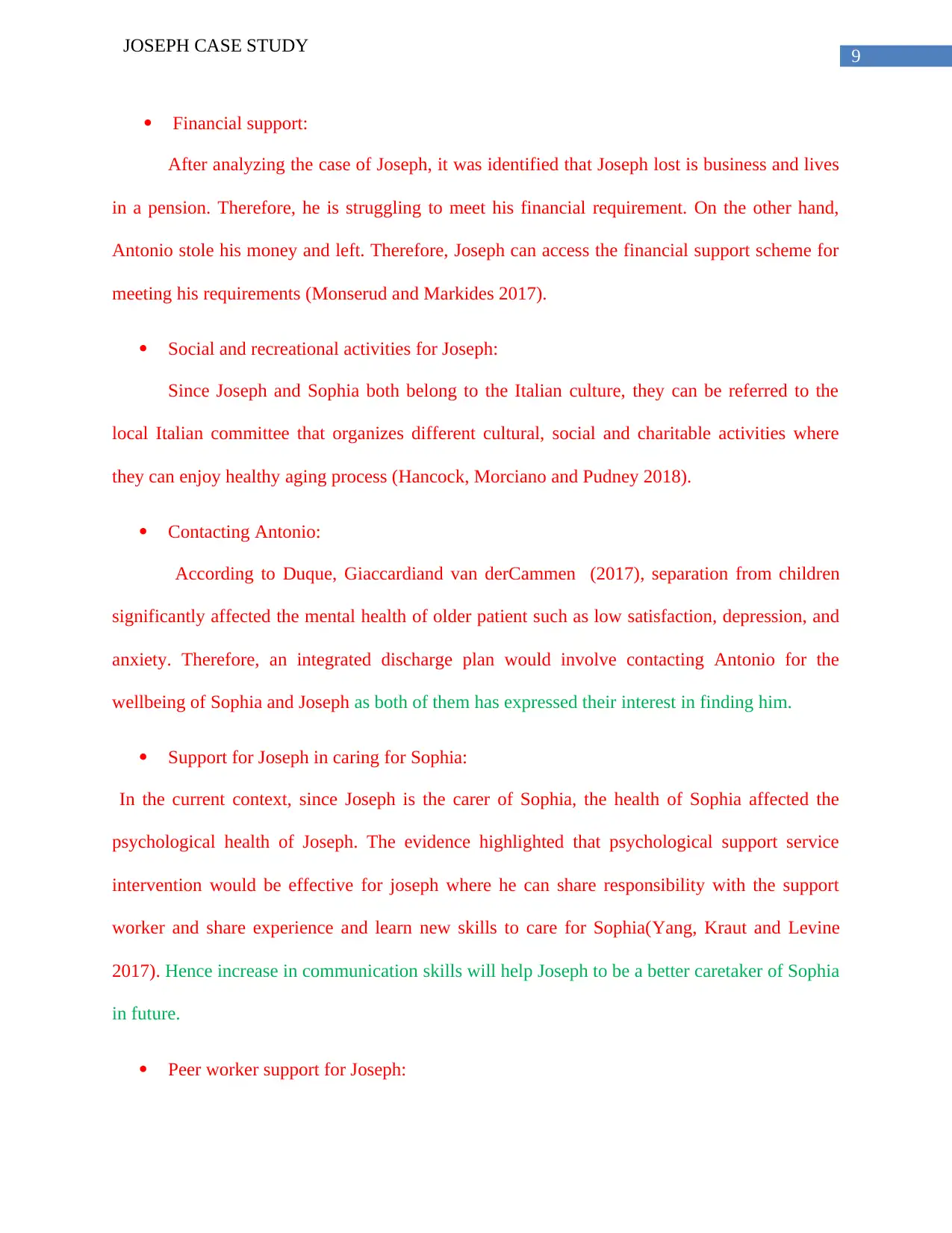
9
JOSEPH CASE STUDY
Financial support:
After analyzing the case of Joseph, it was identified that Joseph lost is business and lives
in a pension. Therefore, he is struggling to meet his financial requirement. On the other hand,
Antonio stole his money and left. Therefore, Joseph can access the financial support scheme for
meeting his requirements (Monserud and Markides 2017).
Social and recreational activities for Joseph:
Since Joseph and Sophia both belong to the Italian culture, they can be referred to the
local Italian committee that organizes different cultural, social and charitable activities where
they can enjoy healthy aging process (Hancock, Morciano and Pudney 2018).
Contacting Antonio:
According to Duque, Giaccardiand van derCammen (2017), separation from children
significantly affected the mental health of older patient such as low satisfaction, depression, and
anxiety. Therefore, an integrated discharge plan would involve contacting Antonio for the
wellbeing of Sophia and Joseph as both of them has expressed their interest in finding him.
Support for Joseph in caring for Sophia:
In the current context, since Joseph is the carer of Sophia, the health of Sophia affected the
psychological health of Joseph. The evidence highlighted that psychological support service
intervention would be effective for joseph where he can share responsibility with the support
worker and share experience and learn new skills to care for Sophia(Yang, Kraut and Levine
2017). Hence increase in communication skills will help Joseph to be a better caretaker of Sophia
in future.
Peer worker support for Joseph:
JOSEPH CASE STUDY
Financial support:
After analyzing the case of Joseph, it was identified that Joseph lost is business and lives
in a pension. Therefore, he is struggling to meet his financial requirement. On the other hand,
Antonio stole his money and left. Therefore, Joseph can access the financial support scheme for
meeting his requirements (Monserud and Markides 2017).
Social and recreational activities for Joseph:
Since Joseph and Sophia both belong to the Italian culture, they can be referred to the
local Italian committee that organizes different cultural, social and charitable activities where
they can enjoy healthy aging process (Hancock, Morciano and Pudney 2018).
Contacting Antonio:
According to Duque, Giaccardiand van derCammen (2017), separation from children
significantly affected the mental health of older patient such as low satisfaction, depression, and
anxiety. Therefore, an integrated discharge plan would involve contacting Antonio for the
wellbeing of Sophia and Joseph as both of them has expressed their interest in finding him.
Support for Joseph in caring for Sophia:
In the current context, since Joseph is the carer of Sophia, the health of Sophia affected the
psychological health of Joseph. The evidence highlighted that psychological support service
intervention would be effective for joseph where he can share responsibility with the support
worker and share experience and learn new skills to care for Sophia(Yang, Kraut and Levine
2017). Hence increase in communication skills will help Joseph to be a better caretaker of Sophia
in future.
Peer worker support for Joseph:
Paraphrase This Document
Need a fresh take? Get an instant paraphrase of this document with our AI Paraphraser
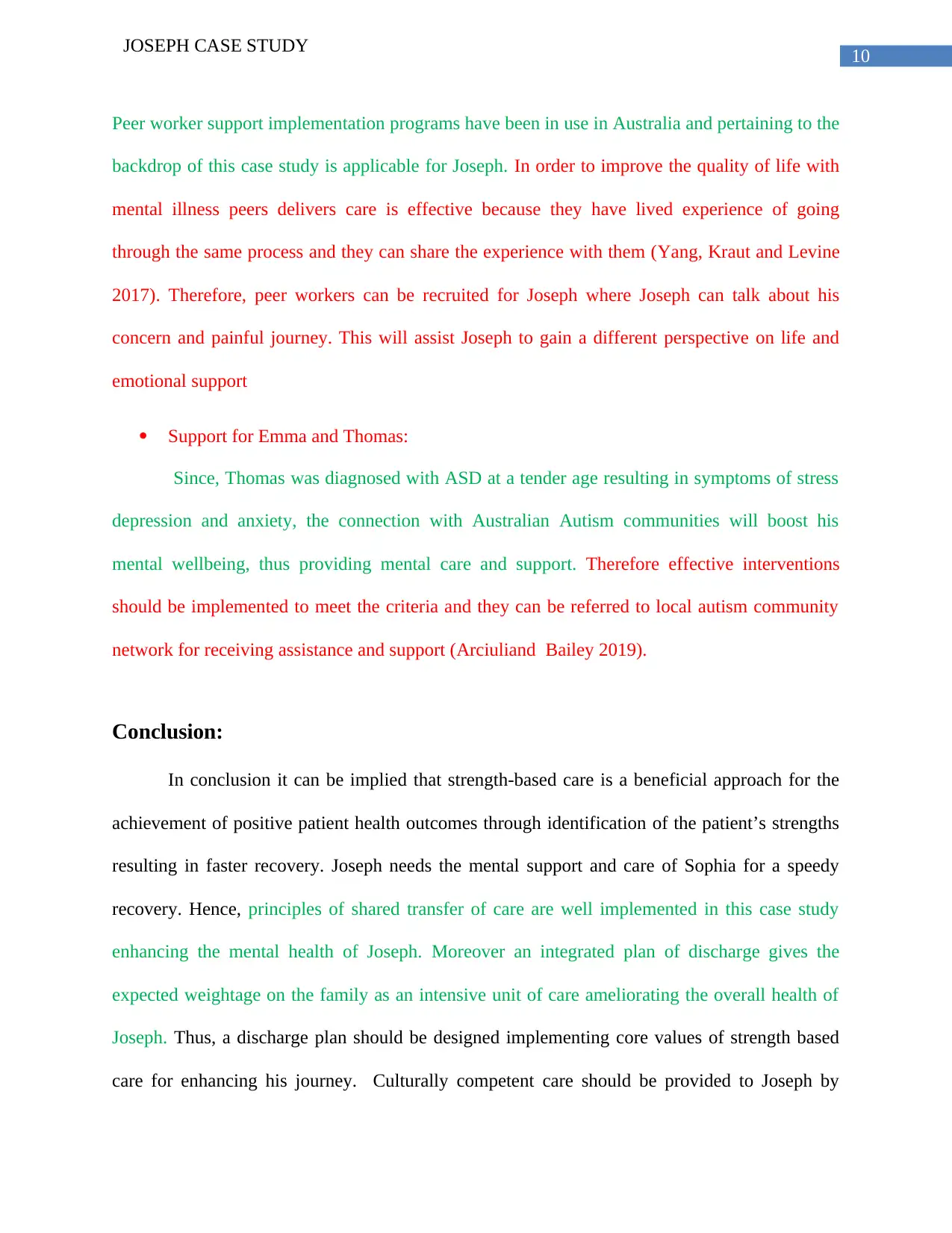
10
JOSEPH CASE STUDY
Peer worker support implementation programs have been in use in Australia and pertaining to the
backdrop of this case study is applicable for Joseph. In order to improve the quality of life with
mental illness peers delivers care is effective because they have lived experience of going
through the same process and they can share the experience with them (Yang, Kraut and Levine
2017). Therefore, peer workers can be recruited for Joseph where Joseph can talk about his
concern and painful journey. This will assist Joseph to gain a different perspective on life and
emotional support
Support for Emma and Thomas:
Since, Thomas was diagnosed with ASD at a tender age resulting in symptoms of stress
depression and anxiety, the connection with Australian Autism communities will boost his
mental wellbeing, thus providing mental care and support. Therefore effective interventions
should be implemented to meet the criteria and they can be referred to local autism community
network for receiving assistance and support (Arciuliand Bailey 2019).
Conclusion:
In conclusion it can be implied that strength-based care is a beneficial approach for the
achievement of positive patient health outcomes through identification of the patient’s strengths
resulting in faster recovery. Joseph needs the mental support and care of Sophia for a speedy
recovery. Hence, principles of shared transfer of care are well implemented in this case study
enhancing the mental health of Joseph. Moreover an integrated plan of discharge gives the
expected weightage on the family as an intensive unit of care ameliorating the overall health of
Joseph. Thus, a discharge plan should be designed implementing core values of strength based
care for enhancing his journey. Culturally competent care should be provided to Joseph by
JOSEPH CASE STUDY
Peer worker support implementation programs have been in use in Australia and pertaining to the
backdrop of this case study is applicable for Joseph. In order to improve the quality of life with
mental illness peers delivers care is effective because they have lived experience of going
through the same process and they can share the experience with them (Yang, Kraut and Levine
2017). Therefore, peer workers can be recruited for Joseph where Joseph can talk about his
concern and painful journey. This will assist Joseph to gain a different perspective on life and
emotional support
Support for Emma and Thomas:
Since, Thomas was diagnosed with ASD at a tender age resulting in symptoms of stress
depression and anxiety, the connection with Australian Autism communities will boost his
mental wellbeing, thus providing mental care and support. Therefore effective interventions
should be implemented to meet the criteria and they can be referred to local autism community
network for receiving assistance and support (Arciuliand Bailey 2019).
Conclusion:
In conclusion it can be implied that strength-based care is a beneficial approach for the
achievement of positive patient health outcomes through identification of the patient’s strengths
resulting in faster recovery. Joseph needs the mental support and care of Sophia for a speedy
recovery. Hence, principles of shared transfer of care are well implemented in this case study
enhancing the mental health of Joseph. Moreover an integrated plan of discharge gives the
expected weightage on the family as an intensive unit of care ameliorating the overall health of
Joseph. Thus, a discharge plan should be designed implementing core values of strength based
care for enhancing his journey. Culturally competent care should be provided to Joseph by

11
JOSEPH CASE STUDY
considering the cultural values and ethics of cultural practice. Lastly, by establishing goals and
implementing interventions, the quality of their life will be improved.
JOSEPH CASE STUDY
considering the cultural values and ethics of cultural practice. Lastly, by establishing goals and
implementing interventions, the quality of their life will be improved.
⊘ This is a preview!⊘
Do you want full access?
Subscribe today to unlock all pages.

Trusted by 1+ million students worldwide
1 out of 15
Related Documents
Your All-in-One AI-Powered Toolkit for Academic Success.
+13062052269
info@desklib.com
Available 24*7 on WhatsApp / Email
![[object Object]](/_next/static/media/star-bottom.7253800d.svg)
Unlock your academic potential
Copyright © 2020–2026 A2Z Services. All Rights Reserved. Developed and managed by ZUCOL.





